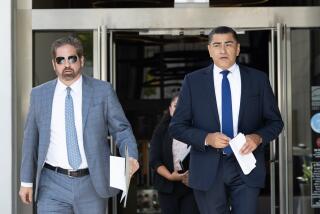Investigators Ordered Changes in Accused Marine’s Lie Detector Results
- Share via
WASHINGTON — Naval Investigative Service headquarters ordered two field agents to change from “non-deceptive” to “deceptive” their rankings of Marine Cpl. Arnold Bracy’s reponses to lie detector test questions about espionage at the U.S. Embassy in Moscow, officials acknowledged Thursday.
The disclosure appeared to strike another blow at the military’s troubled investigation and prosecution of the first-ever espionage allegations involving the elite unit assigned to guard America’s most sensitive diplomatic installation.
According to the officials, who spoke on condition that they not be identified, the action was ordered by NIS headquarters in March to correct an “administrative error” made by the two San Diego-based NIS agents who interrogated Bracy, one of two former Marine security guards now facing espionage charges.
Officials Expect No Impact
The officials said that the two agents failed to follow long-standing Defense Department instructions on analyzing polygraph results. They said that public disclosure of the fact that the investigators’ ranking of Bracy’s responses had been countermanded should have no impact on prosecution of the case.
But Bracy’s attorneys called the development “most significant” and said that when Bracy’s pre-trial military hearing resumes next Tuesday they will seek to question under oath the senior Navy officials involved in the decision.
“This shows the lengths to which they have gone since the beginning to find something on Cpl. Bracy, whether it is there or not,” said Charles Carter, a Baltimore-based NAACP lawyer representing the 21-year-old Marine.
Lonetree’s Lawyer Responds
And Michael V. Stuhff, a Las Vegas lawyer representing Sgt. Clayton J. Lonetree, who faces a military trial this summer on espionage charges, said that “this is an example of the extent to which pressure is being brought to bear to make these young men scapegoats.”
“It proves just how far people in the bureaucracy will go to make these men suffer for the sins and omissions of people higher up,” Stuhff added.
The defense attorneys contend that the findings of deception were used during the interrogation to pressure Bracy into a confession.
Last month, the Marine Corps pared down its espionage case against Lonetree, dropping charges that he had allowed Soviet agents access to sensitive areas of the embassy. The charges that were dropped were based largely on Bracy’s confession--later recanted--that he collaborated with Lonetree to allow Soviet agents to roam through the building. Bracy claimed that he had given the statement under duress during interrogation by NIS agents.
Four days after the most explosive charges against Lonetree were dropped, the Marines freed Sgt. John J. Weirick, another former embassy security guard in the Soviet Union, because the military statute of limitations on his alleged offenses had expired.
Lawyers Seek Release
Bracy’s lawyers filed motions with a military magistrate Thursday seeking his release from the brig at Quantico, Va., on grounds that the Marines already had dropped the allegation of providing access to the embassy. The magistrate did not rule immediately. Bracy is still accused of fraternizing with Soviet citizens.
When the closed pretrial hearing for Bracy resumes at Quantico on Tuesday after a two-week recess, his lawyers are expected to focus many of their questions on the polygraph tests he was administered during a five-day period last March at Twentynine Palms, Calif.
Set of Three Questions
The controversy centers on how the Naval Investigative Service ranked Bracy’s responses to a set of three questions:
“Has anyone ever asked you to engage in espionage against the United States?
“Have you ever engaged in espionage against the United States?
“Besides what you have told us, have you had any other secret meetings with any Russians?”
Bracy answered “no” to each of the questions, officials said Thursday, and the recordings made by the polygraph machine showed that there was “no deception indicated” on the first two questions and “deception indicated” on the third question.
Agents Report Results
The two NIS agents interrogating Bracy, Michael Hurt and James Pender, sent a message to NIS headquarters on March 21 reporting the individual readings to each of the questions, according to the officials.
Three days later, the officials said, NIS headquarters sent the agents a message instructing them to change their analysis and to record responses to all three questions as “deception indicated.” On March 26, the agents complied in another message to NIS headquarters.
NIS officials declined to release the messages, saying that they still are classified as secret and are part of confidential judicial proceedings. But persons who have read parts of the messages confirmed the officials’ account and noted that the agents’ March 26 message said that the March 21 message should be destroyed.
The officials said that the agents made an “administrative error” in reporting Bracy’s responses to individual questions. They said long-standing Defense Department instructions to polygraph examiners is that analysis must be based on “a set of questions.”
‘Usually Asked in Sets’
“Questions are usually asked in sets of three and if the subject shows deception to any of the three, DOD policy is that the subject must be regarded as showing deception to all three,” one official said. He elaborated:
“Utilizing a control question technique, a polygraph examination operates on the theory of psychological set. Psychological set is based upon the presumption that the examinee will channel his fears and concerns freely and involuntarily” into the single question in the set that “poses the most immediate threat to his well being,” possibly allowing lies on the other two questions to go undetected by the equipment.
“When evaluation of polygraph charts indicates deceptive criteria is present in one or more relevant questions, the conclusion reached by the examiner will be ‘deception indicated’ to the entire examination.”
Officials Point to Confession
The officials said the fact that headquarters countermanded the field agents’ initial report had no bearing on the Bracy case. “He already had confessed by the time the message was sent back from Washington,” one official said in apparent reference to Bracy’s since-recanted statement that he collaborated with Lonetree.
Carter, the Baltimore lawyer who is representing Bracy along with two Marine lawyers, criticized the investigators’ conduct. “They sent in their report saying that he was non-deceptive at the same time they were telling him he was being deceptive,” he said.
Even if the prosecution does not attempt to use the results of the test in its case, the defense is expected to seek to make the government’s handling of it an issue. Carter said that the defense also would call a private polygraph expert to testify when Bracy’s hearing resumes. Defense lawyers say that many private polygraph experts dispute the validity of the “psychological set” theory followed by the NIS.
More to Read
Sign up for Essential California
The most important California stories and recommendations in your inbox every morning.
You may occasionally receive promotional content from the Los Angeles Times.













